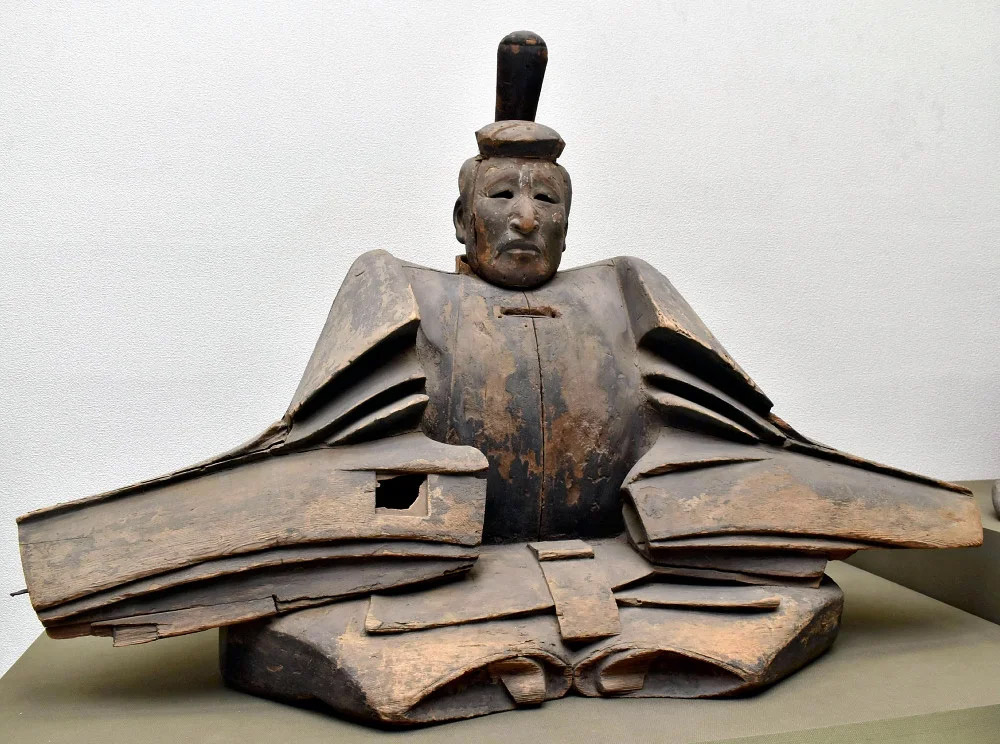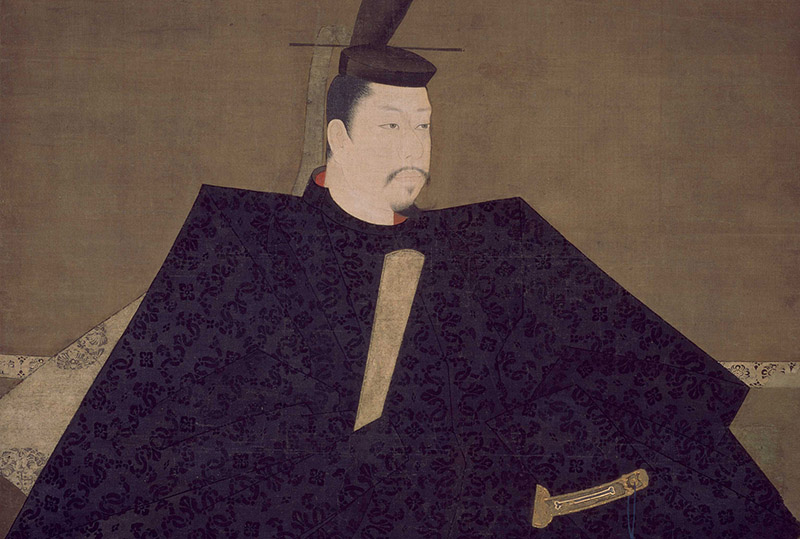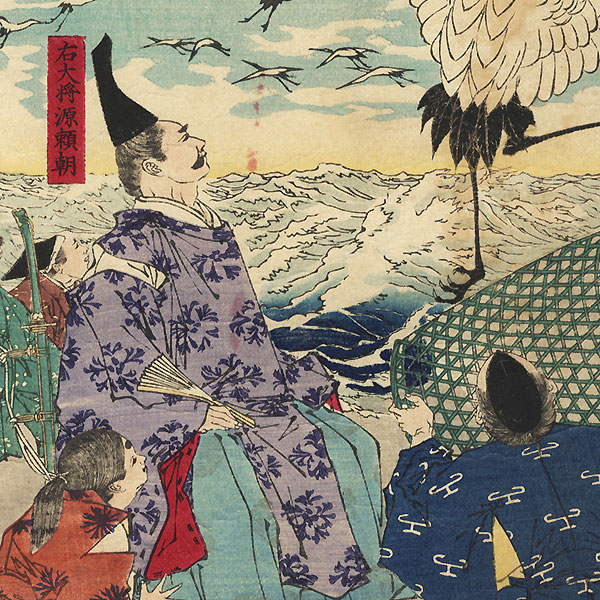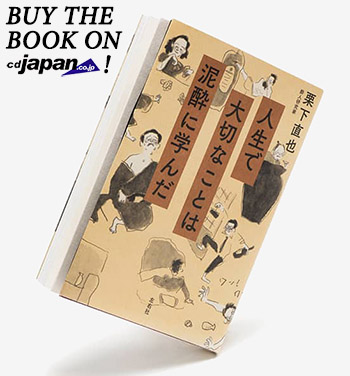Minamoto no Yoritomo
If you’re told that it’s “anything goes tonight”
Samurai | 9 May 1147 – 9 February 1199
“Tonight, it’s no-holds-barred! Just drink away!”
Even if it’s your superior telling you so, you would do best not to end up so zonked that you’re smacking them on the shoulder, looking all disheveled as you’re going, “Hey, boss! Boss! Booosssss!!”
More than ten years ago now, I was a new employee at this company. Just a few days after I’d started there, someone uttered the phrase “no-holds-barred.” I took those words literally.
That evening, I drank and I drank and I drank, and I ended up falling asleep on the last train of the night. I was lying there, spread-eagled on the floor of that crowded train, not concerned in the least about how I might be perceived by my boss who was also on that train making his way home.
When I got to work the next day, I was instantly being treated like I was somehow this unstable “guy who sleeps on the floors of crowded trains” type. (By the way, isn’t it interesting how in Tokyo trains, even when it’s totally crowded, if someone who looks like trouble walks in it’s like suddenly there’s this free space opened up for him out of nowhere? Like he was splitting the ocean or something? What’s the deal with that anyway?)
But while my catastrophic incident described above might suggest otherwise, causing trouble at company get-togethers isn’t really considered acceptable. On the contrary, they might be judging every move you make.
You become relaxed and unrestrained, so you start venting about someone. Your boss sees that, and they might begin suspecting that you’re also badmouthing them when they’re not around. You risk them thinking you’re not to be trusted.
These older folks who use drinking parties as a place to test people—the “anything-goes-but-not-really guys“—have been around since ages past.
Everyone knows this famous portrait of a mustached man donning his kanmuri headwear. Minamoto no Yoritomo, founder of the Kamakura shogunate, used to be someone they taught us about in elementary and junior high school, but he’s now starting to disappear from the textbooks.
Today, the theory that this man with the mustache is actually not Yoritomo but in fact Ashikaga Takauji’s younger brother, Ashikaga Tadayoshi, is gaining prominence. Once upon a time, Tadayoshi and Takauji were in a conflict which escalated into the Kanno Disturbance, a nationwide civil war, leading to Tadayoshi’s death. (The bookworms among you may have heard of publisher Chuokoron-Shinsha’s Kanno Disturbance, which was their attempt at trying to catch lightning in a bottle twice after the major bestseller Onin War.)
Okay, so Yoritomo was mistaken for a man who had by chance come into the limelight all because of this little civil war nearly 700 years ago. But then what did he actually look like?
Well, compared to that portrait we all know, there’s a good chance that the real Yoritomo was more on the chubby side. He probably looked very different from our image of him. Looking at the people who have played him in historical TV dramas, one older example would be Ishizaki Koji in Kusa Moeru (where Yoritomo was the protagonist), while recently you also had Nakai Kiichi in Yoshitsune. Neither one of them is chubby in the least.
Be that as it may, while his physical appearance might have been different from what we had all previously imagined, on the inside he still remains the same person. And let me tell you, Yoritomo was a prime example of the “anything-goes-but-not-really guy.”

Statue considered by historian Kuroda Hideo the only accurate depiction of Minamoto no Yoritomo
There was an ongoing rivalry between Yoritomo and his little brother, Yoshitsune, which had reached a critical point.
Yoritomo, along with his subordinates, were looking frenziedly for Yoshitsune who had gone into hiding. Yasuda Yoshisada, governor of Totomi (now: Western region of Shizuoka prefecture), came to give Yoritomo his situation report.
Yoritomo expressed his gratitude to Yoshisada for having gone through the trouble of coming all this way to see him. “So how is everything as of late? Hey, drink all you like!” Yoshisada, quickly feeling at ease in his liquored-up state, began to blabber about all sorts of things.
He mentioned how Katsuta Shigenaga had recently transferred positions, having been appointed to a new post, and wasn’t that just amazing. He was, in other words, saying that one of Yoritomo’s subordinates had left the Imperial Court to take on the position of Vice Minister at this government office called the Diplomacy and Buddhism Office. Yoritomo, however, showed no particular interest in the subject, and the two just continued their conversation, moving from one topic to the next.
Yoshisada had recently gone hunting, so he presented Yoritomo with a deer skin he had acquired. Yoritomo was absolutely delighted by this, and Yoshisada merrily kept drinking more and more, thinking he’d just scored some real points with his boss.
But just then, Yoritomo returned to the subject of Katsuta Shigenaga’s new post. “Hey, by the way, about what you were saying earlier…” Yoshisada, in his happy talkative mood, told Yoritomo everything he knew about the matter.
Suddenly, Yoritomo’s joyful attitude evaporated. He looked like he was about five seconds away from utterly losing his temper. “So you’re telling me he took this new position without even telling me? What was he thinking?!”
Indeed, what Katsuta Shigenaga had done was basically like if a manager at your company had started working concurrently at a rival company and kept it a secret. It’s no wonder Yoritomo was outraged. But for Yoshisada, it was as if he had just sold out his friend. He felt immense regret. “Wait… Did I just… Did I tell him something I shouldn’t have…?”
(Yoritomo was trying to establish a samurai government at the time, and it was well-known how much he disliked his immediate vassals being appointed in Kyoto. Even the rift between Yoritomo and his brother Yoshitsune had originally come about from Yoshitsune being appointed to office by Emperor Go-Shirakawa.)
Yoritomo would get people drunk, keep in step a little bit, and then get them to talk without restraint. How very sneaky. But this man liked to employ these sneaky techniques of his even when there was no alcohol involved.
There was once a samurai by the name of Shodai Yukihira in what is now Higashimatsuyama City, Saitama. Like many warriors at the time, Yukihira left behind some written teachings meant for future generations. (Well, I say “teachings,” but most of them were just boastful stories, and Yukihira’s writings were no exception.)
One time, Yukihira was escorting Yoritomo on a visit at the Izusan Shrine.
As Yoritomo walked down the shrine’s stone bridge, he patted Yukihira on the shoulder and said, “When I’m with you, my dear vassal, I feel at home.” Being told something like this, anyone would be overcome with emotion. Yukihira, too, obviously wrote down this story (obviously with a smug look on his face) only so as to tell his descendants, “Look how much Lord Yoritomo trusted me!”
But these words were not to be taken at face value. You see, when Yoritomo told someone how much he trusted them, that was actually just his favorite party trick.
After he’d raised an army to overthrow the Taira clan, it’s said that on the day preceding the battle Yoritomo individually called up every single soldier and said to them, “I never told you this before, but I just want you to know that I rely solely on you.” While this attempt to leverage human psychology to his advantage was laughable at best, you must understand that at the time Yoritomo probably felt extremely anxious about what awaited him.
“An army to overthrow the Taira clan”—that perhaps makes it sound like this big, grandiose thing. But in his assessment of Yoritomo’s actions at this battle, historian Hosokawa Shigeo describes it merely as a “bandit raid.”
Nonetheless, Yoritomo was clamoring for the Taira to be overthrown. And so, they made a surprise attack on Yamaki Kanetaka—the “Yamaki Attack”—which has been described as a battle for the fate of the Hojo clan. The strength of his “army” was a mere 30 or so warriors, and what’s more is that on the day before the battle, four of them suddenly informed him that they wouldn’t be able to come after all. Yoritomo even wondered if maybe he ought to postpone the attack.
At age 14, Yoritomo was defeated during the Heiji Rebellion in his first-ever battle, and he would spend the next 20 years of his life exiled in Izu.
This was a “if you’re not a Taira, you’re not even a person” sort of period in time, and thus no one dared to get too close to Yoritomo. When he got married, the wife’s parents told her she needed to get away from “someone of his ilk,” and they made her leave him. Even on the occasion of his marriage to Hojo Masako, her father was in vehement opposition but Masako managed to force her will.
Marrying Masako meant that Yoritomo now had the Hojo clan’s backing. But at this point in time, the Kanto region—the Hojo clan’s home base—was like a foreign country from the imperial capital’s point of view. In modern-day language, Kanto was seen much like the slums of New York or the Airin district of Osaka today, and the warriors and such who dwelt there were as good as street thugs perpetually shooting up drugs through fits of hysterical laughter.
Someone like Yoritomo, who couldn’t rid himself of his noble origins even if he’d tried, must’ve felt highly apprehensive about these people who came across to him like some sort of gang members.
Call it a cunning way of utilizing alcohol all you like—he simply didn’t care what he had to do over drinks in order to gather information and win over some hearts and minds.
Telling everyone individually how they were “the only person he could trust,” if someone did that today it would get them ridiculed on social media. But back then, in a time when information didn’t get around and it was very much a closed-off society, it’s not difficult to see how Yoritomo’s socializing techniques might prove effective.
Ask any office worker and they’ll all tell you the old adage: “you can’t choose your boss.” Some bosses are like the happy-go-lucky fellows played by comedian actors, while other bosses are wholly untrustworthy like Minamoto no Yoritomo.
Superiors and subordinates alike are always trying to figure each other out, especially in the wake of personnel changes. Do bear in mind the very real possibility that your new boss might be the “Yoritomo type”—even when he tells you how he wants to have a “a proper heart-to-heart” with you, be sure that what you tell him isn’t too much from the heart.
By the way, it wasn’t just Yoritomo. Higher-ups proclaiming to their subordinates how they need not worry and that they can just drink away—this is an age-old custom. The origins of the word “bureikou” (“no-holds-barred party”) can be traced back to the late Kamakura period (1185–1333) and the times of Emperor Go-Daigo.
A court favorite by the name of Hino Suketomo and others would hold a banquet called “Bureikou,” as recorded in texts like Taiheiki and Hanazono Tenno Shinki. Here, people from all walks of life would gather together, regardless of status or position, and the men wore their hair loose and disheveled—with even monks ending up in their underwear—while the women wore thin, unlined kimonos, serving the men drinks in their near-nude state. (Osaka Yomiuri Shimbun, 2004/05/10 Evening Edition)
Back in those days, people were routinely fussy about the exact order that toasts were made. But at these banquets, no one cared. Everyone simply partook in the delicacies of the mountains and the sea as well as the booze lined up on the tables, all while engaged in their drunken, riotous merrymaking.
And yet, it’s also said that it was in fact Emperor Go-Daigo himself organizing these banquets which he knew would be used as a front for secret meetings where they discussed their plans to overthrow the shogunate. The attendees were there to probe each others’ true intentions, while the Emperor was busy trying to determine exactly how loyal his vassals were.
No matter how they might cheerfully tell you how it’s “no-holds-barred tonight,” it would seem that one can’t ever just completely let loose—not then, not now, not ever.



